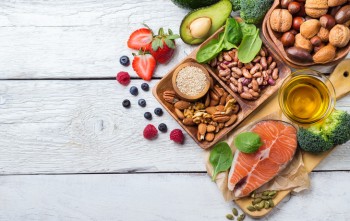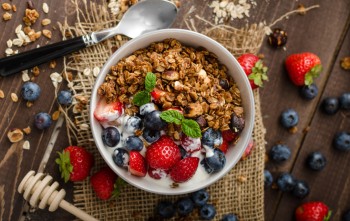13 Healthy Breakfast Recommendations to Boost Productivity

Did You Know? A balanced breakfast with the right portion size offers long-term health benefits, helps maintain an ideal weight, regulates blood sugar levels, and meets essential nutritional needs.
Nutrition experts emphasize the importance of breakfast as it serves as the initial "fuel" that kickstarts metabolism. By choosing a quality breakfast, an individual can experience positive impacts on productivity and daily life quality.
Still reluctant to have breakfast? Check out these 13 interesting breakfast foods that are suitable for breakfast:
What Is Breakfast?
Breakfast is an essential act that involves consuming the first meal of the day after the body has rested overnight. It is the moment when the body begins the process of replenishing energy and the necessary nutrients needed to perform various biological functions. Nutrients obtained from breakfast, such as fiber, protein, vitamins, and minerals, provide a strong foundation for enhancing concentration and maximizing physical and mental performance.
Benefits of Breakfast and Reasons Not to Skip Morning Breakfast
Benefits of Breakfast
- Early Energy and Nutrition: Breakfast provides the body with the energy and nutrients needed after fasting overnight. It helps activate the digestive system and revitalize metabolism.
- Improved Concentration: Eating in the morning enhances focus and concentration. Absorbed nutrients help the brain function optimally, affecting productivity and learning ability.
- Weight Management: A balanced breakfast helps regulate appetite throughout the day, preventing overeating during lunch or dinner.
- Enhanced Physical Performance: A breakfast rich in protein and complex carbohydrates can boost physical performance, whether in sports or daily activities.
- Blood Sugar Regulation: Breakfast helps maintain stable blood sugar levels, preventing sharp spikes and drops that can affect mood and energy.
Reasons Not to Skip Morning Breakfast
- Nutrient Intake: Skipping breakfast can lead to a deficiency in essential nutrients required for growth and bodily functions.
- Weight Gain Risk: Skipping breakfast can trigger overeating when the first meal is consumed, increasing the risk of weight gain.
- Impact on Concentration: Without breakfast, concentration and cognitive endurance may decrease, affecting work and daily activities.
- Metabolism Effects: Avoiding breakfast can slow down metabolism, affecting calorie burn and weight loss.
- General Health Impact: The habit of skipping breakfast can increase the risk of long-term health issues, such as metabolic disorders and heart disease.
Important Nutrients in a Healthy Breakfast Menu
- Complex Carbohydrates: Complex carbohydrates from sources like whole-grain bread, oatmeal, or whole cereals provide sustained energy and help maintain stable blood sugar levels.
- Protein: Protein helps build and repair body tissues. Good protein sources for breakfast include eggs, low-fat yogurt, or soy products.
- Fiber: Fiber aids digestion and keeps you feeling full for longer. Fruits, vegetables, and whole grains are excellent sources of fiber.
- Vitamins and Minerals: Fruits and vegetables provide essential vitamins like vitamin C and vitamin A, along with minerals like potassium and magnesium.
- Healthy Fats: Healthy fats such as monounsaturated and polyunsaturated fats can be found in avocados, nuts, and olive oil.
- Calcium: Calcium-containing foods like low-fat milk or calcium-enriched plant-based options are essential for bone health.
- Antioxidants: Colorful fruits and vegetables typically contain antioxidants that help fight free radicals and maintain cell health.
- B Vitamins: Whole grains and fortified breakfast cereals often contain B-complex vitamins that support metabolism and nerve function.
- Fish Oil: If possible, adding omega-3 sources like fatty fish (salmon, sardines) or fish oil supplements can support brain and heart health.
Tips for Choosing a Good Breakfast for Your Health
- Food Variety: Choose foods from various nutrient groups like carbohydrates, protein, fiber, vitamins, and minerals to meet your body's needs.
- High Fiber: Opt for fiber-rich foods like oatmeal, whole grains, fruits, and vegetables to aid digestion and provide longer-lasting satiety.
- Reduce Added Sugar: Avoid breakfast foods that are too high in added sugar. Read nutrition labels on processed foods and ensure the sugar content is not excessive.
- Protein Source: Ensure there is a protein source in your breakfast, such as eggs, low-fat yogurt, or soy products. Protein helps maintain muscle mass and keeps you feeling full.
- Healthy Fats: Choose healthy fats from sources like avocados, nuts, and olive oil, and avoid foods high in saturated fats.
- Fruits and Vegetables: Include at least one serving of fruits or vegetables in your breakfast. They provide essential vitamins, minerals, and antioxidants.
- Seek Calcium: If possible, select calcium-containing foods like low-fat dairy or calcium-fortified plant-based options for bone health.
- Good Carbohydrates: Opt for complex carbohydrates like whole wheat bread, whole cereals, or oatmeal instead of refined carbohydrates with added sugars.
- Portion Control: Pay attention to portion sizes to avoid overeating. Avoid consuming high-calorie foods in large portions.
- Beverage Choice: Choose healthy beverages like water, herbal tea, or unsweetened fruit juice.
- Prepare in Advance: If you're short on time, prepare healthy breakfast ingredients the night before to make mornings easier.
Variety of Healthy Breakfast Choices
Granola
Granola is a combination of foods consisting of grains like oats, natural sugars, healthy oils, and optional additions like nuts, seeds, or dried fruits. It is baked until crispy. Now, this healthy breakfast option is available in convenient, hygienic, delicious, and nutritious packaging, especially YAVA Granola.
Cashew Nuts
Cashew nuts, also known as cashews, are a type of nut that comes from the cashew tree (Anacardium occidentale). These nuts grow at the end of the cashew apple and have a sweet and nutty flavor. High-quality cashew nuts, especially those from Karangasem Bali, are known for their natural sweetness and tenderness, thanks to the volcanic soil where they grow. Cashew nuts can be enjoyed as a healthy snack or added to various dishes, including granola, to provide essential nutrients such as unsaturated fats, protein, fiber, vitamin B, magnesium, iron, and zinc.
Sorghum
Sorghum (Sorghum bicolor) is a grain crop belonging to the grass family (Poaceae). It is one of the world's important cereal crops and serves as a staple food in various regions worldwide. Sorghum has good nutritional value, containing carbohydrates, fiber, protein, vitamins, and minerals such as iron and magnesium. Being gluten-free, sorghum serves as a suitable alternative for those with gluten sensitivities or allergies. Sorghum can be found in YAVA variants like Granola Puffs and Krispi Puffs.
Eggs
Eggs are a high-quality source of protein containing all essential amino acids required by the body. Additionally, egg yolks contain healthy fats, including monounsaturated fats and omega-3 fatty acids, which are beneficial for heart and brain health. Eggs can be prepared in various delicious and nutritious ways for breakfast, such as omelets, boiled eggs, or as sandwich fillings.
Oats
Oats are known to contain beta-glucan, a type of soluble fiber with health benefits. Beta-glucan can help lower LDL cholesterol levels (bad cholesterol) in the body and support digestive health. Oats are often used as a source of complex carbohydrates in breakfast, and they can be prepared as hot or cold oatmeal or used in other recipes like granola.
Fruits
Incorporating fruits into breakfast provides significant health benefits. Fruits are rich in fiber, vitamins, minerals, and antioxidants vital for the body. There are various ways to enjoy fruits for breakfast, whether fresh, added to yogurt or oatmeal, or blended into fruit smoothies. Combining fruits with protein sources like yogurt or eggs creates a balanced and satisfying breakfast.
Banana Smoothies
Banana smoothies are a delicious and nutritious breakfast choice. You can also experiment with variations by adding ingredients like yogurt, protein powder, or other fruits to your banana smoothie. To create a smoothie with higher fiber content, consider adding green vegetables like spinach or kale. Banana smoothies provide energy from bananas, protein from milk, and essential nutrients such as vitamin B6, vitamin C, potassium, and calcium, making them a quick and delicious way to start the day with good nutrition.
Waffles
Waffles are typically made from a batter of flour that is poured into a specialized waffle iron to form a repeating pattern. The nutritional content of waffles can vary depending on the ingredients used in their preparation, as well as their size and toppings. A general estimate for the nutritional content of a standard waffle (around 70 grams) without toppings is approximately 200-250 calories (depending on size and ingredients), about 30-40 grams of carbohydrates, 4-6 grams of protein, 6-10 grams of fat, 1-2 grams of fiber (depending on the type of flour used), along with small amounts of vitamin B, iron, calcium, sugar, and potassium.
Cereal
Cereal is a food typically made from grains such as wheat, corn, or rice and is often processed into a ready-to-eat form. The nutritional content of cereal can vary depending on the brand, type of grains used, additional ingredients, and serving size. The actual nutritional value may differ depending on the brand and type of cereal you choose. When selecting cereal, it's advisable to choose varieties that have whole grains as their main ingredient, contain minimal added sugar, and are fortified with essential vitamins and minerals.
Yogurt
Yogurt is a dairy product produced by fermenting lactic acid bacteria in milk. This fermentation process converts lactose in milk into lactic acid, giving yogurt its characteristic texture and tangy flavor. Yogurt is a nutrient-rich food with various health benefits, making it a suitable breakfast companion. Nutrients in yogurt include protein, calcium, vitamin B, probiotics, fats, and carbohydrates.
Smoothies
A smoothie is a beverage made by blending various ingredients such as fruits, vegetables, milk or yogurt, with the addition of ice or crushed ice. Having a smoothie for breakfast is highly recommended, considering the multitude of nutrients in one serving. You can add protein powder, yogurt, chia seeds, flaxseeds, honey, almonds, or spirulina powder to enhance the protein, vitamin, and mineral content.
Conclusion
Breakfast refers to the first meal of the day consumed in the morning after waking up. Nutritionists stress the importance of breakfast in providing early energy and essential nutrients required by the body after overnight fasting. A balanced and nutritious morning meal has the potential to enhance focus, performance, and overall well-being. By understanding the benefits and valuable reasons for not neglecting breakfast, we can better appreciate its indispensable role in maintaining health and boosting daily performance.
It is essential to vary the choices in a healthy breakfast menu by combining various types of foods from different nutrient groups. This ensures that the body receives essential nutrients to face the day with optimal energy and vitality.
The recommended breakfast menu should provide a range of important nutrients to generate energy and meet the body's needs. Making wise choices in selecting breakfast is a fundamental step in maintaining health. By adhering to the guidelines outlined earlier, you can design a beneficial breakfast choice that supports overall health.
Find healthy breakfast products from YAVA in your favorite online stores:


















